Neighborhood Semantics for Modal Logic: Short Textbooks in Logic
Autor Eric Pacuiten Limba Engleză Paperback – 23 noi 2017
This book offers a state-of-the-art introduction to the basic techniques and results of neighborhood semantics for modal logic. In addition to presenting the relevant technical background, it highlights both the pitfalls and potential uses of neighborhood models – an interesting class of mathematical structures that were originally introduced to provide a semantics for weak systems of modal logic (the so-called non-normal modal logics).
In addition, the book discusses a broad range of topics, including standard modal logic results (i.e., completeness, decidability and definability); bisimulations for neighborhood models and other model-theoretic constructions; comparisons with other semantics for modal logic (e.g., relational models, topological models, plausibility models); neighborhood semantics for first-order modal logic, applications in game theory (coalitional logic and game logic); applications in epistemic logic (logics of evidence and belief); and non-normal modal logics with dynamic modalities.
The book can be used as the primary text for seminars on philosophical logic focused on non-normal modal logics; as a supplemental text for courses on modal logic, logic in AI, or philosophical logic (either at the undergraduate or graduate level); or as the primary source for researchers interested in learning about the uses of neighborhood semantics in philosophical logic and game theory.
Preț: 314.41 lei
Nou
Puncte Express: 472
Preț estimativ în valută:
60.16€ • 62.98$ • 49.78£
60.16€ • 62.98$ • 49.78£
Carte tipărită la comandă
Livrare economică 05-19 aprilie
Preluare comenzi: 021 569.72.76
Specificații
ISBN-13: 9783319671482
ISBN-10: 3319671480
Pagini: 154
Ilustrații: XII, 154 p. 17 illus.
Dimensiuni: 155 x 235 x 12 mm
Greutate: 0.25 kg
Ediția:1st ed. 2017
Editura: Springer International Publishing
Colecția Springer
Seria Short Textbooks in Logic
Locul publicării:Cham, Switzerland
ISBN-10: 3319671480
Pagini: 154
Ilustrații: XII, 154 p. 17 illus.
Dimensiuni: 155 x 235 x 12 mm
Greutate: 0.25 kg
Ediția:1st ed. 2017
Editura: Springer International Publishing
Colecția Springer
Seria Short Textbooks in Logic
Locul publicării:Cham, Switzerland
Cuprins
Introduction and Motivation.- Subset Spaces.- Language and Semantics.- Why Non-Normal Modal Logic?.- Core Theory.- Richer Languages.
Recenzii
“Neighbourhood frames offer an interpretation to systems of modal logic that generalises the more traditional relational frames. … Complemented with the numerous pointers to the literature that it provides, the book will be a valuable source of information and practice for PhD students.” (Éric Martin, zbMATH 1390.03001, 2018)
“Reading and writing a review of this wonderful book has been a pleasure. Knowing the basics of propositional modal logic may explain why I enjoyed reading it. The author has gathered and surveyed many papers in writing this book. This is a must-read for those who want to do research on neighborhood semantics--after having acquired a basic knowledge of modal logic.” (Manoj K. Raut, Computing Reviews, February, 2019)
Notă biografică
Eric Pacuit is an Assistant Professor of Philosophy at the University of Maryland, USA. Before coming to Maryland, Eric worked at Stanford University, USA; at the Institute for Logic, Language and Computation at the University of Amsterdam, Netherlands; and at the Tilburg Institute for Logic and Philosophy of Science at Tilburg University, Netherlands. His research primarily addresses issues in interactive epistemology and group decision-making – two interdisciplinary areas that make use of ideas and techniques from logic (especially modal logic), philosophy, game theory and social choice theory. His research has been generously supported by a grant from the National Science Foundation and a VIDI grant from the NWO (the Netherlands Organization for Scientific Research).
Textul de pe ultima copertă
This book offers a state-of-the-art introduction to the basic techniques and results of neighborhood semantics for modal logic. In addition to presenting the relevant technical background, it highlights both the pitfalls and potential uses of neighborhood models – an interesting class of mathematical structures that were originally introduced to provide a semantics for weak systems of modal logic (the so-called non-normal modal logics).
In addition, the book discusses a broad range of topics, including standard modal logic results (i.e., completeness, decidability and definability); bisimulations for neighborhood models and other model-theoretic constructions; comparisons with other semantics for modal logic (e.g., relational models, topological models, plausibility models); neighborhood semantics for first-order modal logic, applications in game theory (coalitional logic and game logic); applications in epistemic logic (logics of evidence and belief); and non-normal modal logics with dynamic modalities.
The book can be used as the primary text for seminars on philosophical logic focused on non-normal modal logics; as a supplemental text for courses on modal logic, logic in AI, or philosophical logic (either at the undergraduate or graduate level); or as the primary source for researchers interested in learning about the uses of neighborhood semantics in philosophical logic and game theory.
Caracteristici
Provides both the relevant technical background and an overview of the key applications of neighborhood semantics in modal logic Introduces the main techniques for reasoning about neighborhood structures with a modal language Highlights the most convincing applications of neighborhood semantics for modal logic Includes applications such as coalitional logic, game logic, dynamic logics of belief and evidence, subset space logic, and first-order extensions Explains the precise relationship between neighborhood models and relational models, topological models, plausibility models, and (two-sorted) first-order logic Includes supplementary material: sn.pub/extras

